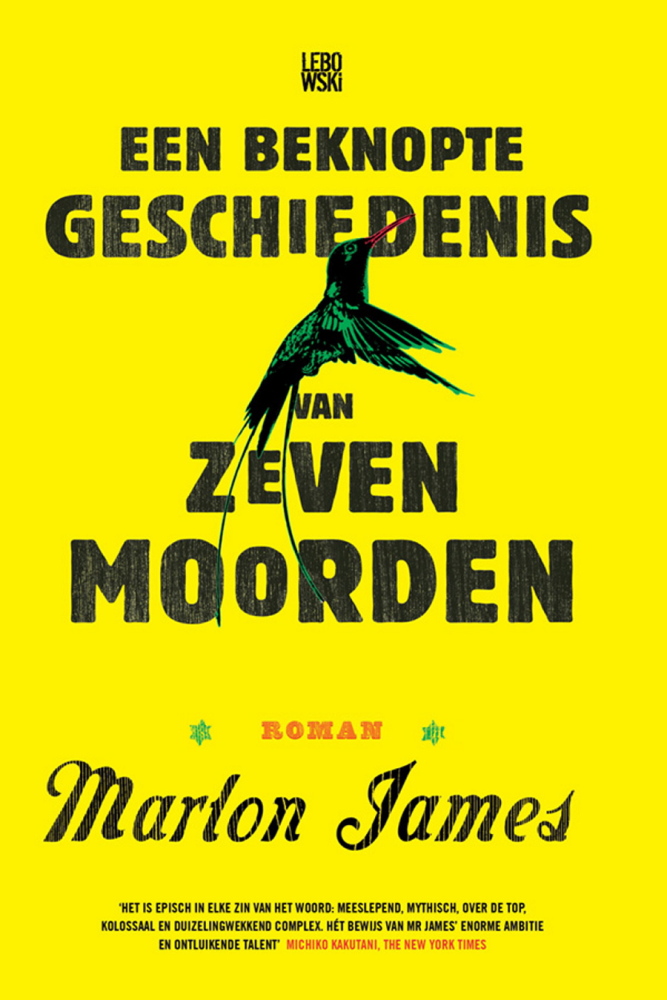Marlon James’ “A Brief History of Seven Killings” should win some kind of award for ironic untruth-telling in titling. It is indeed a novel, though a historical one based on real events. At nearly 700 dense pages, often written in Jamaican patois, it’s anything but brief. And the corpses quickly add up to many more than seven.
One body not added to the count, at least not at the time intended by his would-be assassins, was that of Bob Marley. James’ epic, multifaceted story revolves around the Rasta reggae superstar, and the failed assassination attempt in December 1976, just two days before he planned to play – and remarkably, did – a Smile Jamaica concert in Kingston meant to ease political tensions in the island nation.
Those tensions run through every page of “Seven Killings,” a sprawling saga that carries the story of Marley’s would-be killers to Miami and New York in the early 1990s and dazzlingly employs more than a dozen narrators who tell their own versions of events.
Like a capacious 19th-century novel crossed with a paranoid Don DeLillo conspiracy-theory thriller, the book is a low-burning spliff that begins with a four-page list of 76 characters. The reader needs to refer to it frequently.
After title-page quotes from Bonnie Raitt (“Gonna tell the truth about it / Honey, that’s the hardest part”) and a cryptic Jamaican proverb (“If it no go so, it go near so”), “Seven Killings” begins in the voice of politician Sir Arthur George Jennings, who moves through the story like a ghost – because that’s exactly what he is.
As the book begins, Jamaica is wracked by drug-fueled gun battles among the supporters of the left-leaning People’s National Party, led by Prime Minister Michael Manley, and the center-right Jamaican Labor Party of former music industry executive (and later prime minister) Edward Seaga. The book examines CIA efforts to destabilize Manley’s government, seen as drifting close to Fidel Castro’s Cuba.
Marley, never named or heard from but referred to only as “The Singer,” is caught in the middle. The widely worshipped international superstar lives in a house on a hill on Hope Road, and is the object of the envy and rage of many.
Among the many characters telling this tale are gang leaders and enforcers with names such as Papa-Lo, Shotta Sheriff and Josey Wales, as well as shooters with sobriquets such as Weeper and Bam-Bam. The last is introduced in a grisly, masterfully rendered set piece in which his family is murdered.
The standout female character is Nina Burgess, a onetime Marley paramour who is the novel’s voice of reason. She strives to escape to greater economic opportunity in the United States. CIA station chief Barry DiFlorio is a high-strung hothead coping with clandestine operatives and a wife whose fondest wish is to get out of Jamaica. Alex Pierce is a Rolling Stone journalist sent to Kingston to chase Mick Jagger gossip. He quickly senses he’s in over his head in a Wild West country where Jamaicans are equally obsessed with Clint Eastwood and the gunfighter ballads of Marty Robbins.
James grew up in Jamaica and teaches in Minnesota. “Seven Killings” is his third and most ambitious novel. He’s skilled at weaving pop culture into his narrative, with “Dukes of Hazzard” references and one section of the book moving to the beat of Andy Gibb’s 1979 hit “Shadow Dancing.”
He’s also expert at giving authentic voice to myriad characters. Gang leaders are apt to drop offhand profundities. On the eve of the assassination attempt, in which both Marley and his wife Rita were wounded, Papa-Lo wonders why he tends to get philosophical at the end of the year: “Maybe because is December. After all, only when we come to Revelation that we take stock of Genesis, right?”
“A Brief History of Seven Killings” can be rough going. Quotation marks are rarely employed, and it’s often difficult to be sure who’s talking to whom. But the book rewards time spent, bringing a complex perspective on violence, corruption and the untidiness of humanity to vivid life and astonishing detail. It makes you want to rush out and read everything else James has written.
Send questions/comments to the editors.



Success. Please wait for the page to reload. If the page does not reload within 5 seconds, please refresh the page.
Enter your email and password to access comments.
Hi, to comment on stories you must . This profile is in addition to your subscription and website login.
Already have a commenting profile? .
Invalid username/password.
Please check your email to confirm and complete your registration.
Only subscribers are eligible to post comments. Please subscribe or login first for digital access. Here’s why.
Use the form below to reset your password. When you've submitted your account email, we will send an email with a reset code.